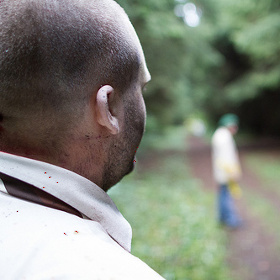Undead uncovered

I have to admit to having a fascination with zombies. I've watched quite a few movies about the undead, and at the moment I'm particularly enjoying The Walking Dead, a TV mini-series now in its fourth season.
The fascination for me is not so much the gore, which still makes me cringe, even after almost-50 episodes. It's more the question of "What's important in life?". If the apocalypse strips away all the stuff that fills our lives and fills our screens, what's left that's worth living for? What deep sources of meaning and worth survive?
Undead lifestyle
The zombie apocalypse robs the survivors of all those things that made their previous lives enjoyable.
[a group of women are washing clothes in the quarry]
Carol: "I do miss my Maytag."
Jacqui: "I miss my coffeemaker, with that dual-drip filter and built-in grinder, honey."
Andrea: "I miss my Benz. My sat-nav."
Amy: "My computer. Texting."– The Walking Dead
Life is reduced to bare survival. It's a hedonist's nightmare. The survivors' remaining pleasures are simple – fresh meat cooked over a fire; a hot shower; living to see another day.
Post-apocalyptic religion
"I can't profess to understand God's plan, but Christ promised a resurrection of the dead. I just thought he had something a little different in mind."
– Hershel, The Walking Dead
It's interesting to watch the characters in The Walking Dead struggle with the question of "Where is God? and "What will he do about this?".
For some like Hershel, the apocalypse refines their faith in Jesus. While we at times see Hershel struggling with doubts or being unrealisticly optimistic, faith in Jesus ultimately gives him wisdom and a deep humanity.
For those characters who are atheists, these sentiments are either useless or a distraction from the business of survival. As Mark Hadley observes, zombies resonate with the atheist worldview …
"Zombies are an atheist’s apocalypse, the ultimate proof there can’t be a God because He couldn’t allow this to happen – even though He hasn’t. And the biggest difference between the decaying zombie and the well-dressed vampire is the conviction that there is no coming back from death. It’s not a doorway, it’s a dead-end."
Zombie rights
 A recurring theme of the zombie apocalypse is the total collapse of government, society and infrastructure. And as the survivors band together, they have to work out how to live together.
A recurring theme of the zombie apocalypse is the total collapse of government, society and infrastructure. And as the survivors band together, they have to work out how to live together.
As The Walking Dead has evolved through four seasons, the storyline has explored these issues at length. Should decisions be made democratically, or should we look to a strong leader? Should a person who is a potential threat get a fair trial, or should they be summarily executed?
The lesson seems to be that human rights are a worthy ideal, but one that is sacrificed in order to survive. Characters who speak out for rights have a habit of being killed off.
Human rights activists like Martin Luther King and Nelson Mandela framed their values in the teachings of Jesus and the Jewish prophets. Teachings that understood human rights were endowed by God, and therefore not something that can be denied. Yet, in The Walking Dead, even upright, humane leaders like Rick have an ethic that is "red in tooth and claw".
The apocalypse
In popular usage, the word "apocalypse" means "destruction or damage on a catastrophic scale". But the original meaning of this word is "an uncovering, a revelation".
If Hadley is right and zombies are an "atheist's apocalypse" then what do zombies reveal about a godless worldview? I think there at least two observations.
Firstly, death strips away all that we feel makes life worthwhile and enjoyable. So while we might fill our days with pleasant sensations, the judge of "Was my life a good one?" dies with us, and the question is left unanswered.
And secondly, human rights is a pleasant fiction. A gentleman's agreement, put aside when needed.
The Christian view on these matters is stated by Hershel, in a scene where his group is under attack by another group led by a psychopath. Hershel leaves an open Bible with the following verse highlighted for his attackers to read …
the hour is coming, in which all that are in the graves shall hear his voice, and shall come forth; they that have done good, unto the resurrection of life; and they that have done evil, unto the resurrection of damnation
God's raising of people to be judged shows that he considers that life is meaningful, and that justice is important.

